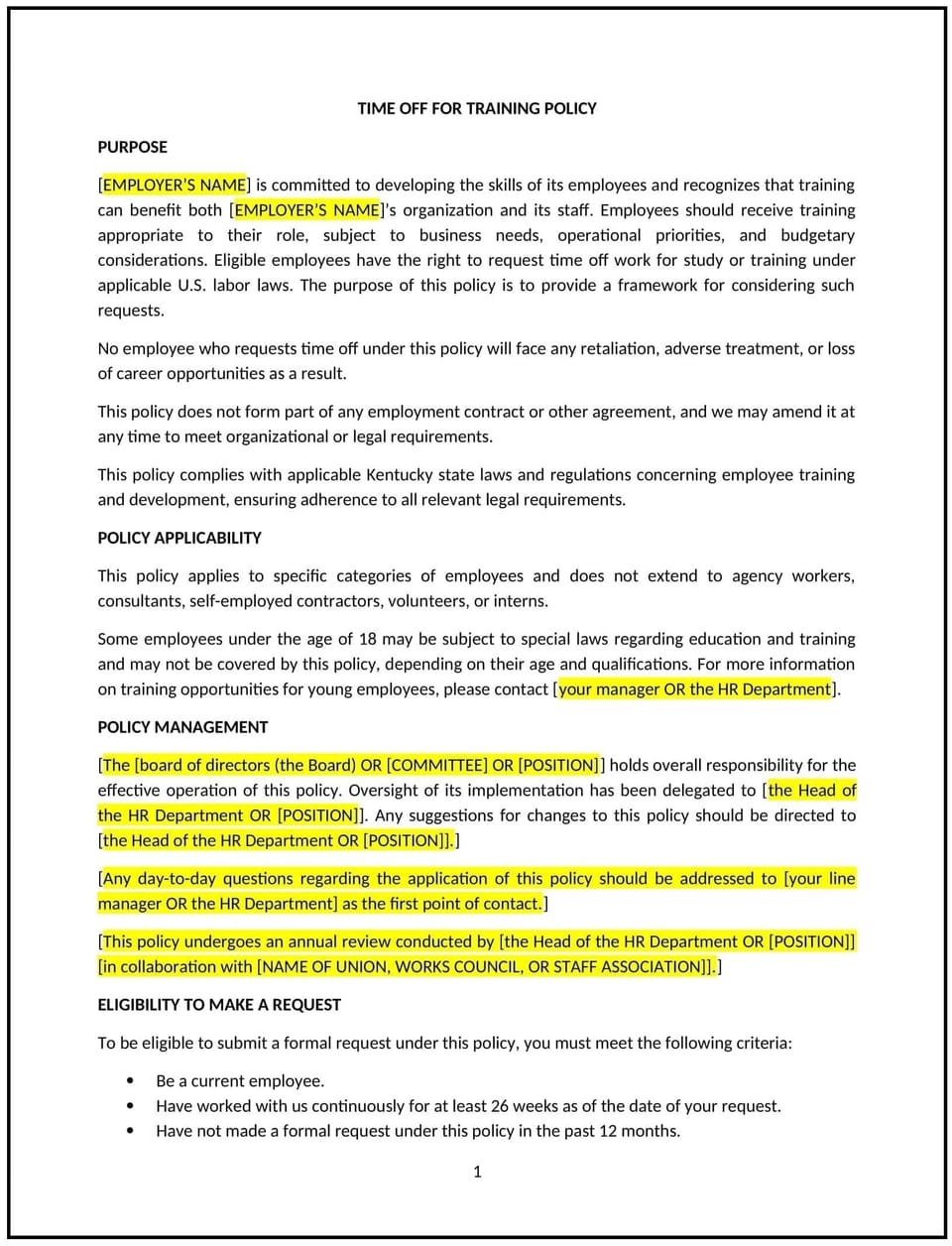Time off for training policy (Kentucky): Free template

Time off for training policy (Kentucky)
A time off for training policy provides Kentucky businesses with guidelines for granting employees leave to participate in job-related training, professional development, or certifications. This policy supports skill enhancement while maintaining workplace productivity and operational balance.
By adopting this policy, businesses can invest in employee growth, improve performance, and foster a culture of learning.
How to use this time off for training policy (Kentucky)
- Define eligible training: Specify the types of training or development activities covered, such as workshops, seminars, certification courses, or industry conferences.
- Address employee eligibility: Outline criteria for employees to qualify for training leave, including tenure, role, or relevance of the training to their position.
- Clarify paid vs. unpaid leave: Indicate whether time off for training is paid, unpaid, or partially compensated, depending on the nature of the training and its alignment with business goals.
- Establish application procedures: Provide instructions for employees to request training leave, including advance notice, training details, and any required approvals.
- Link to business goals: Encourage employees to pursue training that aligns with business objectives or enhances their job performance.
- Set reimbursement guidelines: If applicable, clarify whether the business will cover training costs, such as fees, travel, or materials, and under what conditions.
- Include post-training expectations: Outline requirements for employees to share knowledge or apply new skills gained during training to their work.
Benefits of using this time off for training policy (Kentucky)
This policy provides several key benefits for Kentucky businesses:
- Encourages professional development: Supports employees in gaining new skills or certifications, enhancing their capabilities.
- Improves job performance: Helps employees apply up-to-date knowledge and skills to their roles, benefiting the business.
- Attracts and retains talent: Demonstrates the business’s commitment to employee growth and career progression.
- Promotes alignment: Ensures training activities align with organizational goals and priorities.
- Fosters a learning culture: Creates an environment where continuous improvement and development are valued.
Tips for using this time off for training policy (Kentucky)
- Communicate the policy: Ensure employees are aware of training leave opportunities and the application process through onboarding and ongoing communication.
- Encourage relevant training: Promote training options that align with business goals or enhance employees’ current roles.
- Track training outcomes: Monitor how employees apply new skills or knowledge to assess the value of the training investment.
- Provide manager training: Equip managers with the tools to evaluate training requests fairly and effectively.
- Review regularly: Update the policy to reflect changes in Kentucky laws, workplace needs, or industry training standards.
Q: What types of training are covered under this policy?
A: The policy covers job-related training such as workshops, certification courses, seminars, and industry-specific conferences.
Q: Is time off for training paid or unpaid?
A: Time off may be paid, unpaid, or partially compensated, depending on the training’s relevance and alignment with the business’s goals.
Q: How can employees request training leave?
A: Employees should submit a request to their manager or HR, including details about the training and its relevance to their role.
Q: Will the business cover training costs?
A: The business may cover costs such as fees, travel, or materials if the training aligns with organizational objectives, as outlined in the policy.
Q: Are there requirements for employees after completing training?
A: Employees may be asked to share knowledge or demonstrate how they will apply the new skills to their work.
Q: What if training conflicts with business needs?
A: Managers and employees can work together to find a mutually agreeable time or alternative training options to minimize disruptions.
Q: How are training requests evaluated?
A: Requests are evaluated based on the training’s relevance to the employee’s role, alignment with business goals, and operational considerations.
Q: How often should this policy be reviewed?
A: The policy should be reviewed periodically to ensure it reflects current laws, business practices, and training opportunities.
This article contains general legal information and does not contain legal advice. Cobrief is not a law firm or a substitute for an attorney or law firm. The law is complex and changes often. For legal advice, please ask a lawyer.


